Are you considering getting a Leonberger or already have one and wondering about their lifespan?
It’s common knowledge that no dog can be our companion indefinitely. Additionally, due to their large size, Leonbergers might not have as long a lifespan as smaller breeds.
So, what is the typical lifespan of Leonbergers? And is there anything you can do to prolong their life expectancy? Join us as we explore these and other questions below.
How Long Do Leonbergers Live?
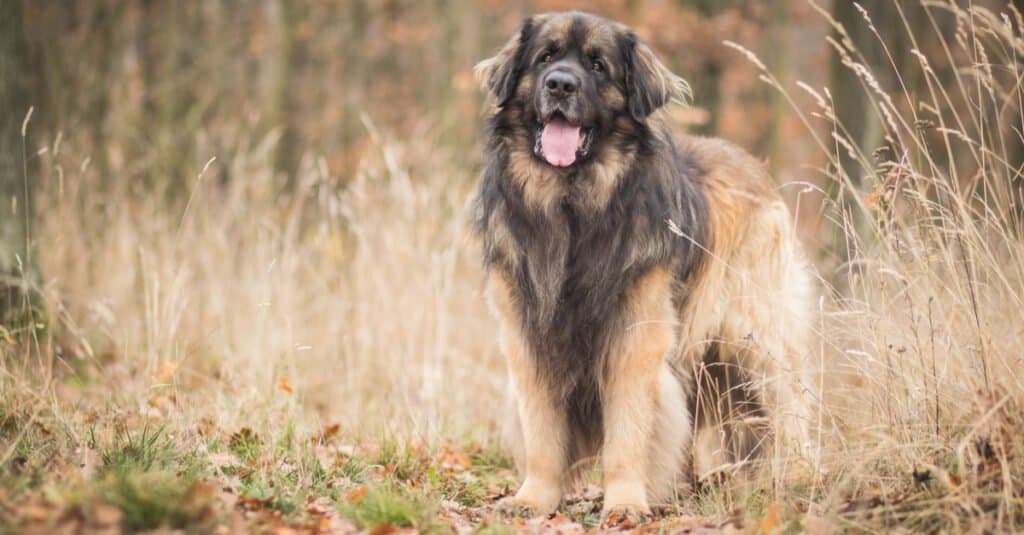
Sadly, Leonbergers have a relatively short lifespan.
©AnetaZabranska/Shutterstock.com
Most reputable sources indicate that Leonbergers typically live between seven to nine years.
A report by the Kennel Club and British Small Animal Veterinary Association Scientific Committee states that the average lifespan of a Leonberger is seven years. Rarely, some Leonbergers may surpass this expectancy by up to four years.
However, the lifespan of a specific Leonberger will be influenced by various factors such as their external environment, size, and overall health.
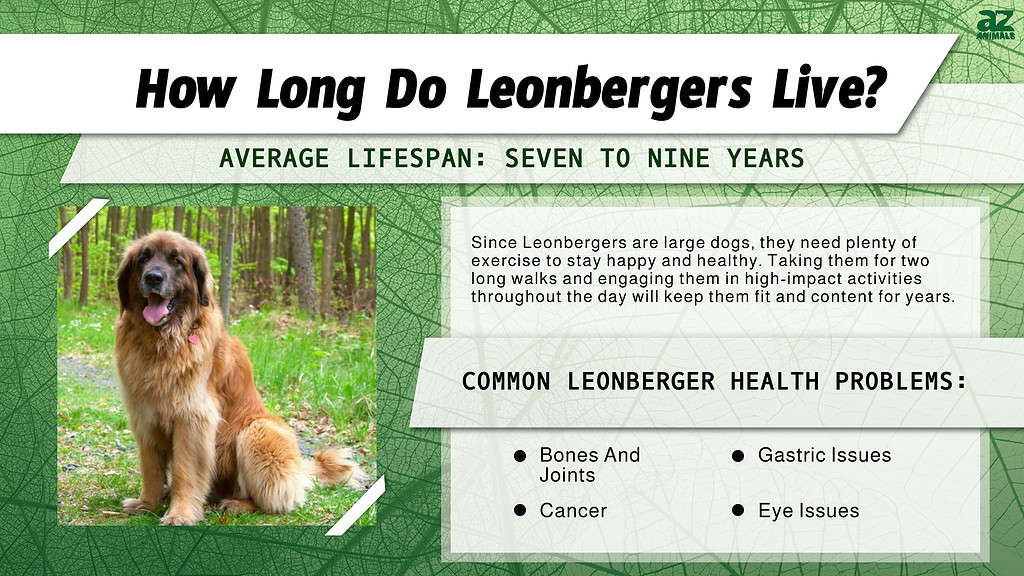
How Old Was the Oldest Leonberger to Ever Live?
According to the mentioned report, some Leonbergers reached the age of 13, and approximately 20% of those surveyed lived to be 10 years or older.
The longest-lived Leonberger documented is Su-Riya (formerly known as Genette of Mutsugoro), who lived in Japan and passed away in 2017 at the impressive age of 16 years and three months.
The Grey Muzzle Award
The Grey Muzzle Award, presented by the Leonberger Health Foundation International, is given to Leonbergers who reach the age of 12 — or are approximately 100 in human years! This award is also extended to breeders and owners, recognizing their role in the dogs’ long lives.
In early 2020, an elderly Leonberger named Bronco was honored with this award for his remarkable longevity. For more details, you can check out a blog post written by Bronco’s proud owners.
History of the Leonberger
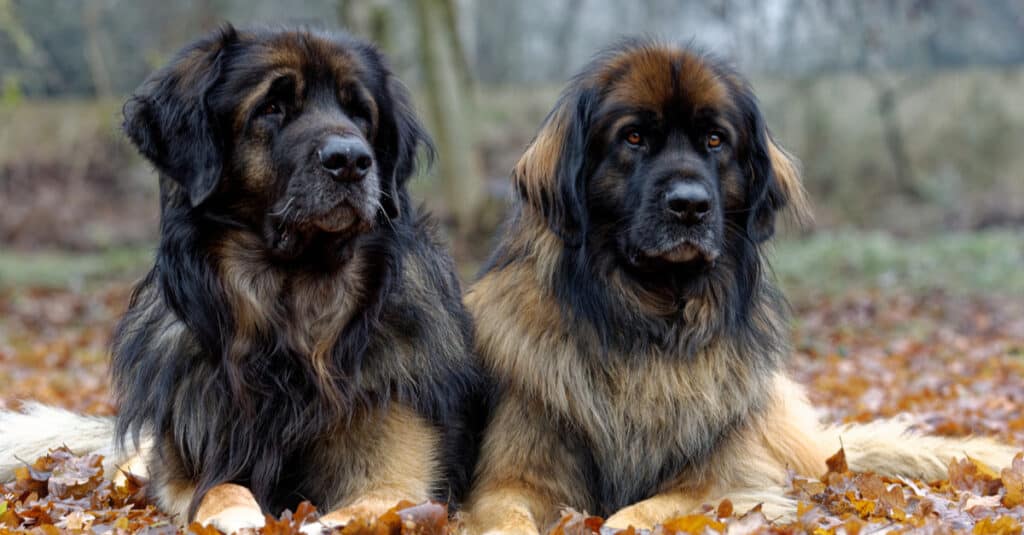
Leonbergers were originally used as working farm dogs, much like many other large dog breeds.
©Colin Seddon/Shutterstock.com
Heinrich Essig, a businessman and dog breeder from Leonberg in Germany, created the Leonberger breed in the mid-1800s. He was inspired by the lion symbol featured on the crest of his town and wanted to find a way to foster similar traits in dogs.
This led him to crossbreed a Landseer Newfoundland female with a male Saint Bernard. He later introduced a Great Pyrenees into the mix, resulting in the development of the Leonberger breed. (As a side note, some claim that Essig may used a Pyrenean mastiff instead of a Great Pyrenees.)
Originally, these dogs were employed as working farm dogs due to their strength and excellent watchdog abilities. They were also skilled at draft work, so you could often find them pulling carts in Bavarian villages. Additionally, they were imported to Canada to assist in search and rescue operations, especially in water-related situations.
World War(s)
During World War I, the Leonberger breed was on the brink of extinction. Some Leonbergers died right on the battlefield; others were simply abandoned and left to fend for themselves, with many starving to death as a result.
The breed was, however, saved due to the relentless efforts of two men, Herr Stadelmann and Herr Otto Josenhans, who tirelessly searched for surviving Leonbergers across Germany after the war. Unfortunately, out of 25 Leonbergers, only five met the breeding standards.
During the Second World War, the German government started managing a special Leonberger breeding program to up the numbers. The Deutsche Club für Leonberger Hunde also re-established the program after the war ended. So, we have them to thank for being able to have Leonbergers in our lives!
Factors That Impact a Leonberger’s Lifespan
Appropriate care can do wonders for your Leonberger.
Still, it is a fact that Leonbergers typically have shorter lifespans than smaller dog breeds. Their size, unfortunately, makes them prone to various illnesses and health problems. However, prioritizing your pup’s well-being can definitely help enhance their life expectancy.
Understanding their health issues and implementing preventive measures, along with sufficient training and proper nutrition, can positively impact the lifespan of your giant canine companion.
We’ll walk you through some common Leonberger health problems below.
Common Leonberger Health Problems

We always recommend doing a health screening as soon as you get your pup (and, preferably, while they’re still young) to decrease health risks.
©Akbudak Rimma/Shutterstock.com
Every Leonberger faces specific health challenges that are important to be aware of and prepared for.
Although it’s impossible to prevent all canine diseases, maintaining a nutritious diet and promoting a healthy lifestyle can significantly decrease the risk of certain illnesses.
Regular visits to the vet are equally important. While knowledgeable breeders and dog organizations can definitely provide valuable guidelines, nothing can replace the expertise of an experienced veterinarian.
Bones And Joints
Osteochondritis Dissecans (OCD) is a prevalent issue among many Leonbergers, causing cracking in the cartilage within their joints. If left untreated, this condition can lead to arthritic joints and may require surgical intervention.
Hip and elbow dysplasia is a common problem in large dogs, affecting joint mobility and growth. To prevent dysplasia in your Leonberger, allow them to exercise on soft surfaces like grassy areas, as this helps minimize the impact on their joints and bones.
Gastric Issues
Bloating, or Gastric Dilatation-Volvulus (GDV), is a common and serious problem in Leonbergers.
It involves the stomach becoming painfully swollen due to food, water, or gas, which can potentially lead to a life-threatening situation. The enlarged stomach can twist, cutting off blood supply and gas escape routes.
If your Leonberger experiences bloat, you should be able to notice it, as the symptoms are quite visible. They include retching, a swollen abdomen, and drooling.
Bloating often happens when the dog eats too quickly. To prevent this from happening, consider using a slow feeder bowl that would allow your pup to eat at a healthier pace. In the long term, maintaining a balanced diet is the key to addressing this issue effectively.
Cancer
According to the Leonberger Health Foundation, cancer, particularly osteosarcoma (bone cancer) and hemangiosarcoma (a type of blood vessel cancer), is sadly the primary cause of death among Leonbergers.
Eye Issues
Cataracts, a degenerative condition among many Leonbergers, cause progressive opacity in the eye lens. Although they don’t shorten a Leonberger’s lifespan, they significantly impact their quality of life.
Other Health Issues
Other health issues that your Leonberger might experience in their lifetime include thyroid disorders, polyneuropathy, and Addison’s disease.
How to Extend the Life of Your Pet Leonberger
Here are the top tips to support your Leonberger’s health.
Training

Accidents and mistakes
willhappen. Just make sure to keep cool, calm, and collected. Patience is key when it comes to dog training.
©iStock.com/lolostock
Since Leonbergers are large dogs, they need plenty of exercise to stay happy and healthy. Taking them for two long walks and engaging them in high-impact activities throughout the day will keep them fit and content for years.
Early training is essential, especially because Leonbergers are so large. Consistent, gentle, and firm training from an early age, without harsh corrections, is key; obedience classes in particular can be highly beneficial.
Also, as with all pups, it’s crucial to socialize Leonbergers properly to avoid behavioral issues. Exposing them to different people, animals, places, and situations while they’re still puppies will help them gain long-term confidence and feel more comfortable in different environments.
Proper Nutrition
Ensuring proper nutrition is crucial for keeping your Leonberger at a healthy weight. Avoid feeding them foods that can cause issues like bloat. Also, keep in mind that Leonbergers don’t need excessive amounts of food despite their giant size.
Finally, it’s widely agreed that puppies, especially in large breeds like Leonbergers, shouldn’t follow diets promoting rapid growth, as this can lead to various health problems.
With that said, we always recommend consulting your vet or breeder for personalized dietary advice based on your Leonberger’s history.
Health Screening
When you welcome your Leonberger into your home, it’s recommended to schedule a health screening. This ensures your furry friend is in excellent health and allows you to identify any potential issues early.
We advise you not to overlook this important step, as it enables early detection and prompt treatment for your Leonberger.
Grooming
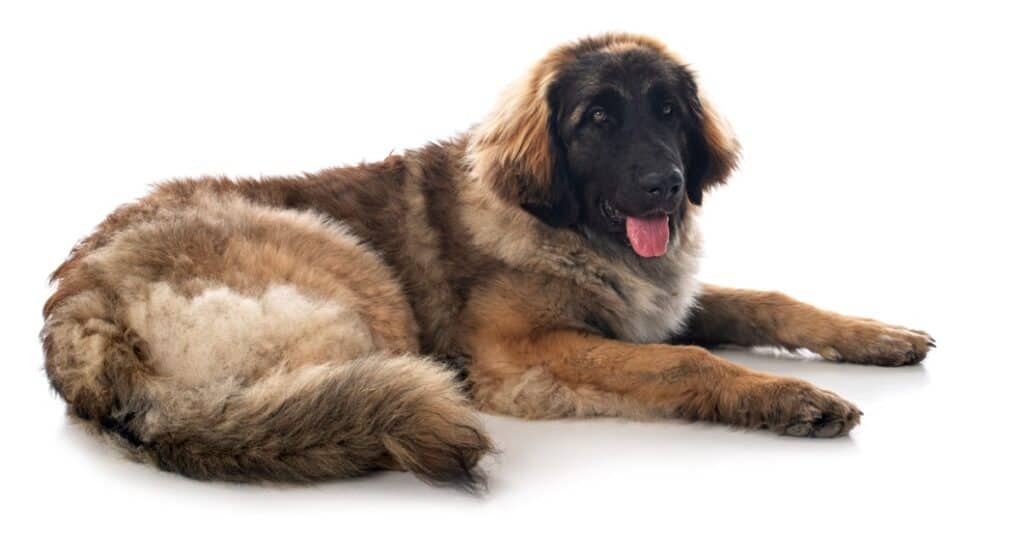
Leonbergers have a long, double coat.
©cynoclub/Shutterstock.com
Leonbergers shed their coats and need regular brushing, with a heavier molt occurring twice a year during seasonal changes. Grooming isn’t just a physical necessity; it’s also an excellent opportunity for bonding between dogs and their owners. A grooming session can be an enjoyable and calming experience for both the owner and the dog.
Should You Get a Leonberger?
The Leonberger is a large, calm, and muscular working dog known for its proud head carriage, balanced build, and distinctive features.
They have tight flews, which help keep their mouth dry and prevent drooling, and are recognized by their soft, sweet expression, and dark brown eyes. Despite their size, they move gracefully with a powerful gait.
This breed is not only giant but also gentle, making it a perfect addition to any family — well, any family with enough space to accommodate them! Their loyalty and docile nature shine through, especially with early training. However, they require significant attention and care to thrive. Their extensive grooming needs, owing to their thick and long coat, demand daily care and commitment.
Considering the time and effort needed, it’s important to note that if you lack the time or space to accommodate a Leonberger in your home, they might not be the right choice for you.
What Is the Ideal Home Environment for A Leonberger?
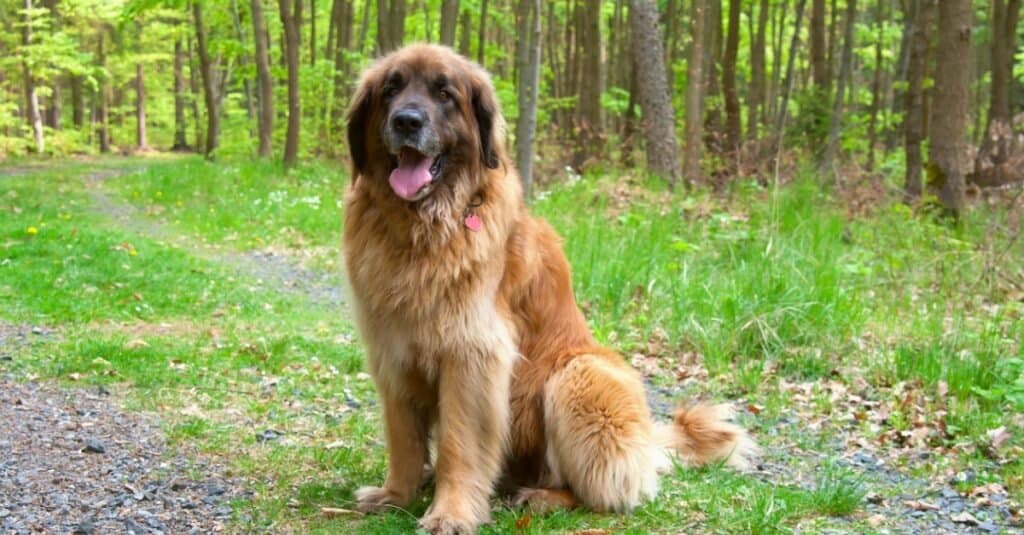
Leonbergers love spending time outdoors.
©Kaca Skokanova/Shutterstock.com
A Leonberger thrives in a cool environment with plenty of outdoor space, making homes with spacious gardens or backyards perfect for them. Adequate space is crucial for them, as it allows them to get enough exercise and stay active.
If you have a family, a Leonberger makes an ideal companion, especially with kids, as they have a natural affinity for children. Furthermore, research indicates that houses without stairs are safer for joint and bone health in all dogs. Therefore, a home without stairs provides the perfect setting for a Leonberger to grow and flourish.
Leonbergers in Family
Primarily a family pet, the Leonberger’s temperament stands out as one of their key traits. When properly trained and socialized, Leonbergers are:
- confident,
- calm around noise,
- respectful to family,
- good with kids,
- friendly to strangers, and
- protective of their family and “property.”
These dogs are strong, loyal, smart, playful, and gentle, making them adaptable and easygoing in different situations.
By being aware of their specific needs and ensuring a loving environment, Leonbergers can live happy, healthy lives, bringing joy to their families for many years.
The photo featured at the top of this post is © Colin Seddon/Shutterstock.com
Ready to discover the top 10 cutest dog breeds in the entire world?
How about the fastest dogs, the largest dogs and those that are -- quite frankly -- just the kindest dogs on the planet? Each day, AZ Animals sends out lists just like this to our thousands of email subscribers. And the best part? It's FREE. Join today by entering your email below.
Thank you for reading! Have some feedback for us? Contact the AZ Animals editorial team.







